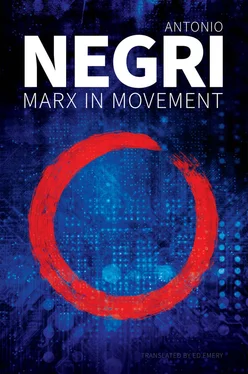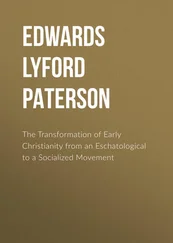As a consequence, the marketing of labour power is no longer an undertaking for minions and sycophants: if anything, the marketing of labour power today has become a totally political operation. This consists in extending Marx’s ‘war’ between capitalism’s tendency towards the limitless working day and the tendency of the proletariat to limit (to nil, if possible) the provision of labour power, and in transforming that ‘war’ into formalized and viable political procedures, which extend from the concrete labour process (within production and reproduction) to the overall scenario of the organization of command – that is, to political and state forms of the management of the economy, management of the labour market, of public spending, and so on. Only in this political dimension can success or failure in the marketing of labour power now be gauged.
All of this is another way of saying that, at our given level of development, the old dialectic of labour power [ la dialettica della forza lavoro ] within and against capital is now played out, has become obsolete, is only of archaeological interest. If there exists any real negotiation or bargaining, this can no longer be encompassed by trade union forms of bargaining or other such antique practices. In other words, the dualism of power is now the norm. The working day can be described only in terms of an active dualism of power wherein the old dialectic of unity, transcendence and equilibrium is obsolete. In making this point I need only refer, by way of example, to the inadequacy of the most normal, everyday and (as it often seems) obvious institutional form of the traditional labour movement: the trade union.
Far more dangerous, as regards the potential mystification of our own concept, rediscovered and reconstructed, of the proletariat, are those ideologies that take labour power as a material that can be led to class consciousness (although they are also more ineffective, given the historical experience of ‘realized socialism’ in the east). To turn labour power into what? To transmute exploited labour into liberated labour, via the magic wand of a mystical ‘political consciousness’, in other words of its vanguard representatives. What has changed in reality? Nothing – only words. The dialectic of labour functions here perfectly. The word ‘labour’ replaces the word ‘capital’: the system remains the same. The working day is not touched. Time measure continues to be the regulative function of command and of partition or division. No – the new (and even the old?) concept of the proletariat really cannot accept these mystifications. The truth is that, from the proletarian point of view, the process of real subsumption brings about such a massive intensification of the composition of the working class, and such an extension of its potentiality, as to eliminate any dualism between being and consciousness, any isolation of single aspects within it. The proletariat acts directly over the entire span of the social working day. Production and reproduction are now, in parallel and on equal terms, the spheres of action proper and adequate to the reality of labour power. Consciousness is an attribute, entirely within and of its material structure.
And now let’s look at work, labour. Here we come to the second set of consequences deriving from our political concept of socialized labour power, of composition (i.e. of the social worker). Labour is the essence of capital. It always has been so. It is also the essence of the human being, inasmuch as the human being is productive activity. But capital is real – while human essence is only a dream. The only human essence of labour that approximates to the concreteness of capital is the refusal of work – or rather that kind of productivity that, for capital, is purely negative – because, while it represents a sine qua non of production, capital nonetheless tends to reduce it, and, precisely insofar as it is an essence of human nature, to eliminate it from production. Human labour, when posited as proletarian reality, is a negative element in capitalist production. Of course, it is true to say that only labour produces. But it is also true that bosses are happy with production only when the labour in it is totally under command: command is sadistic, it requires the presence of human labour, but only in order then to deny it, to nullify it. This process has functioned in the past as the classic steely scourge of capitalist domination – until and unless labour power presents itself as a social subject. In other words we have here, within the intensity and extensity of the composition of the proletarian subject, a negative form of labour, which has such broad dimensions and is so articulated as to render problematical its very definition as ‘negative’. We often refer to it as ‘alternative’, ‘self-valorizing’ and so on. But I prefer to continue calling it ‘negative labour’, not in order to flirt with the language of crisis but simply because I do not yet feel the strength to be able to call it liberated work (i.e. work that is wholly positive). It is difficult to describe any work as ‘positive’ so long as it is contained within capital, such is the quantity of death and pain that it bears within it. For us to call working-class and proletarian work ‘positive’ and socially useful, we would have to be capable – the proletarian subject in its overall complexity would have to be capable – of the statement in prefigurative terms of its alternative form of production. We would require a vision of how its own productive potential could unfold. (Only certain sectors of the proletariat within the area of reproduction – the feminist movement chief among them – have so far proved capable of producing a positive image of forms of work that could be proletarian, alternative and revolutionary.) But the fact that we cannot spell it out does not necessarily mean that it does not exist. It exists as a murmuring among the proletariat. Negative work, amid the whispers of everyday life and the noise and shouting of the struggle, is beginning to gain a general form of expression. What I think needs stressing particularly is the material character of negative work, its institutionality . The concept of proletariat is becoming an institutional reality, a practical emergence – not lifeless, but living; a different conception of time; a universality held within that second nature, entirely factitious (in etymological terms, verum ipsum factum ); an institutionality, thus, that seeks order and a systematization of its own values. The levels, the spaces of this experience are truly thousand-fold. But they all have a centripetal impulse, which increases according to the extent of their liberty, their expansivity. If we are to translate the word ‘communism’ into present-day language, then perhaps it means reinforcing and solidifying this proletarian institutionality and developing its potential contents.
However, for the moment we still require a long period of clarification, of study, and of specific struggles. The method remains tactical. Methodological consequences derive from our definition of the proletarian subject as antagonism within realized subsumption – and they derive, above all, from our understanding of the various aspects of the transition from mass worker to socialized labour power, to the social worker. Within this transition, simultaneously with the breakdown of the regulatory principles of capitalist development (the market, value, the division between production and reproduction etc.), there also unfolds the impossibility of any homogeneous and unified determination not only of the overall design of development, but particularly of its categories, its norms. When the concept of labour power is realized within a socialized and subjectified class composition – and this takes place precisely at the highest point of unity from capital’s viewpoint (real subsumption) – then all the established terms of scientific argument break down. They become blocked, definitively non-recuperable for the old dialectical logic of unity and transcendence. The only way in which any scientific category, whether in logic or in ethics, in politics or in political economy, can constitute itself as a norm is as a negotiated settlement : as a formalization and balancing of opposing forces – in the human sciences, as a moment of voluntary agreement. It is clear that nothing of what defined the old conception of scientific norms is present here. What we have instead, exclusively, is the logical results brought about by the development of class composition – subsumption under capital realized in the form of permanent crisis . What we are presented with is the positive emergence of negative labour as an institutionalized counterpower, acting against work that is subsumed within capital. While labour subsumed under capital corresponded to a logic of unity, of command, and of its transcendence, negative labour produces instead a logic based on separateness – a logic that operates entirely within, is endogenous to, that separateness. The institutionalized forms now assumed by labour power as a separate entity also represent its deinstitutionalization in relation to the present framework of economy and politics, to capital and the state. This relation is precisely a negative one and, inasmuch as negative labour has the power and possibility of imposing it on the system, the only unifying logic that remains is one of duality, twosidedness: a logic that is ephemeral, reduced to mere semblance. In reality it can represent only a moment in a historical phase of crisis, in which the point of reference for all rationality or intelligibility is being rapidly shifted towards a fully socialized labour power, the new class subject, the ‘social worker’.
Читать дальше












